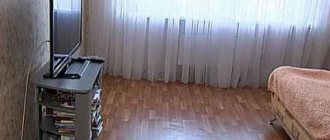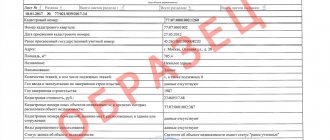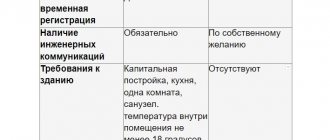The right to use residential premises has nothing to do with the right of ownership. But the restriction or withdrawal of the use of housing must be based solely on the law, since such a right was once granted.
The main legal acts on the use of someone else’s apartment are the Civil and Housing Codes. To defend your right to residence, you need to know where it comes from, how it ends and who is authorized to deprive it.
Ownership and use of residential premises - differences
The rightful owner of a home is its owner. There are two types of housing in Russia:
- private;
- municipal.
The owners of private housing are people or companies, and the owners of municipal housing are the state represented by municipalities.
In this case, the right of ownership can either be registered or not. When registering a right, a certificate of a special form is issued; now such certificates are yellow and pink; until 2003 they were green. This paper is the main document of the owner.
In addition to the certificate in form, there may be another one - an old one, issued in pre-perestroika times, but it is still valid to this day. Such papers were issued for land and houses, and warrants were issued for apartments.
Not all Russians have registered their right to apartments, and they are not trying to register it. After all, the right exists, it’s just not registered. For example, having paid off a share in a cooperative in full, the shareholder is already vested with ownership rights, and no one else has the right to encroach on this apartment.
It’s the same in villages, and even in city apartments - people live from generation to generation, actually accepting an inheritance, and do not think about going to Rosreestr.
Meanwhile, homeowners have the right not only to live in it, but also to dispose of it at their own discretion - to sell, exchange, rent out. They also have the right to register family members and relatives in the apartment. But this does not make relatives co-owners, only users.
For reference. The use of residential premises is simply living in an apartment with the permission of the owner, and it is based on the law.
home
Published: 21 Sep 2021
On amendments to the resolution of the Abakan City Administration dated September 15, 2021 No. 1652 “On the beginning of the heating period 2021 - 2022 in the city of Abakan”
Guided by clause 1, part 1, art. 6 of the Federal Law of July 27, 2010 No. 190-FZ “On Heat Supply”, paragraph 5 of the Rules for the provision of utility services to owners and users...
Read completely
Published: 11 Aug 2021
MUP "Vodokanal" reports that from 23:00 on August 12, 2021 to 23:00 on August 13, 2021, the water distribution facilities on the left bank of Abakan will be disconnected
Read completely
Published: 10 Aug 2021
The Abakanskaya CHPP branch of Yenisei TGC (TSK-13) JSC informs you that on 08/12/2021 from 04-00 a.m. until 08/17/2021 06-00 a.m., in accordance with the agreed schedule of repair work, a complete shutdown of the CHP plant is being carried out . During this period, the supply of hot water to consumers will be stopped.
Read completely
Published: 05 Jul 2021
Telephone message No. 121 dated 07/02/2021
The Abakanskaya CHPP branch of Yenisei TGC JSC (TSK-13) informs you that on 07/05/2021 from 09-00 to 16-30 there will be a shutdown of hot water supply due to the installation of throttle washers. You need to close the inlet valves at the metering units. Buildings subject to shutdown: St. Dr. 41 nations...
Read completely
Published: 11 Jun 2021
The Abakanskaya CHPP branch of Yenisei TGC JSC (TSK-13) reports that on 06/15/2021 from 04:00 until 06/16/2021 16:00 the return pipeline will be completely disconnected, hot water will be supplied through the supply pipeline in dead-end mode.
Read completely
Published: May 15, 2021
The Abakanskaya CHPP branch of Yenisei TGC JSC (TSK-13) reports that on 05/17/2021 from 00:00 until 05/22/2021 24:00, hydraulic tests of pipelines will be carried out for strength and density. During this period, the supply of hot water to consumers will be stopped.
Read completely
Published: Apr 17, 2021
Dear users of the Operation service.
We would like to inform you that meter readings are not currently displayed in your personal account and the “Operation” mobile application. This is due to the update of the readings recording system. We expect to fix this problem by March 31, 2021.
This limitation does not affect...
Read completely
Published: 20 Apr 2020
Dear residents!
In accordance with RESOLUTION dated April 20, 2021 No. 618, the heating season ends on April 20, 2020.
Read completely
Published: Apr 15, 2020
Dear owners!
Due to the difficult economic situation, we ask you to pay utility bills on time. There are no deferred payments for owners. Resource supply organizations demand that debts on all apartment buildings be repaid on time.
The need for timely payment is regulated in the Housing...
Read completely
Published: 02 Oct 2019
Dear owners!
From October 1 to October 10, 2021, the passport office is closed!
Phone number for inquiries: 306-770.
Read completely
How does the right of use arise?
Apart from the owner, anyone can live in the apartment according to these
reasons:
- moving in as a family member;
- under a social rental agreement (in non-privatized apartments);
- by order or contract, employees or employees of the owner (service housing);
- pupils or students (dormitories of universities or vocational schools);
- under a lease agreement (rented apartments);
- under a rent agreement (former owner);
- under a free use agreement;
- by testamentary refusal.
In this case, residents are registered in the apartment permanently or temporarily with the consent of the owner.
Important. A child can be registered without anyone’s consent at the place of residence of one of the parents .
Use by family members
As soon as ownership is registered, according to Article 31 of the Housing Code, the owner can move in and register a family member in the apartment.
The Code defines family members as:
- owner's husband/wife;
- his children and parents;
- other persons (not even relatives) who are moved in as family members of the owner.
As mentioned earlier, the use of property is not its ownership at all, but users have responsibilities. Along with the owner, all residents are required to comply with the rules of residence:
- use the apartment only for living in it;
- preserve housing, do not destroy or damage property;
- pay your share of utility bills.
You can only deprive the right of use through a court if:
- family relations with the owner have ceased (official divorce);
- the owner sold the apartment (the residents are not family members of the new owner).
For reference. You can deprive the right of use in court for other reasons, for example, the tenant is an alcoholic and does not allow the owner to live in peace, destroys the apartment, does not pay bills (but there must be a court decision to collect utility bills from him).
If the apartment is municipal
Haven't you privatized your apartment yet? So you are a user, but not
owner. During privatization, the apartment will be registered as the property of everyone registered in it, and while it is not yours, you are obliged to pay bills and maintain housing.
You can lose use of a municipal apartment in the following cases:
- leaving for another permanent place of residence;
- systematic violation of the rules of living in an apartment (non-payment of utilities for more than six months, destruction and damage to the apartment, communications, illegal redevelopment, violation of the rights of neighbors, use of the apartment for purposes other than residence);
- deprivation of parental rights (if the court finds that the parents do not have the right to live with the child).
Important. If one of the residents goes to live permanently in another place, the others do not lose the right to use the apartment.
Office, rental, rental and student accommodation
There is a contract for the use of residential premises. The terms of the contract are always fixed in writing, and the contract itself must be in the hands of both the owner of the premises and the user. In this case, the annuity agreement is registered in Rosreestr. The lease agreement must also be registered if its term is longer than a year.
The following have the right to use housing:
- workers or employees (for the duration of service or work);
- pupils and students (for the duration of study);
- tenants (for the duration of the lease agreement);
- rent recipients (either for the duration of the contract or for life).
If the terms of the contract are not met, you can legally lose the right to use such housing.
Use of residential premises under a rental agreement for specialized residential premises
The right to use residential premises under a rental agreement for specialized residential premises arises on the basis of a written agreement drawn up in accordance with standard rental agreements for specialized residential premises.
The rights of the tenant are determined in the contract itself.
Obligations of the tenant under the rental agreement for specialized residential premises:
- use the residential premises for the intended purpose and within the limits established by Article 17 of the Housing Code of the Russian Federation: for temporary residence in connection with work, service, training, appointment to a public position of the Russian Federation, a public position of a subject of the Russian Federation, to an elected position;
- for temporary residence of the tenant and members of his family in connection with major repairs or reconstruction of the house, loss of residential premises as a result of foreclosure on this premises, recognition of residential premises as unsuitable for habitation as a result of emergency circumstances;
- for temporary residence if the employer is classified as a citizen in need of social services;
- for temporary residence if the employer is recognized as a forced migrant or refugee;
- for temporary residence if the employer is classified as a citizen in need of special social protection;
- for temporary residence if the employer is classified as an orphan and children without parental care, or among orphans and children without parental care;
The tenant of specialized residential premises does not have the right to exchange the premises, or sublease it.
Family members of the tenant of residential premises, under a rental agreement for specialized residential premises, have equal rights and obligations with him to use the specialized residential premises.
Testamentary refusal
It is easier to explain this concept using an example: a grandfather lived in an apartment with his partner. After his death, the apartment passed to his grandson in his will. However, it turned out that the grandfather’s will directly stated that the cohabitant has the right to use the apartment either for life or for a specified period of time. This is a testamentary refusal.
This right is enshrined in Article 33 of the Housing Code. In this case, the right to use in this mode can be registered in Rosreestr.
For reference. If the apartment is sold by the grandson, the cohabitant will still have the right to live in it.
Agreement for free use of residential premises
This is a special type of agreement; it does not oblige the user to pay anything for living in the apartment. This relationship between the user and
by the owner of the property are described in Chapter 36 of the Civil Code. In this case, the terms of the agreement are mentioned:
- the lender is the owner of the apartment;
- the borrower is the user.
The contract must indicate:
- full passport data of both parties to the contract;
- rights and obligations of the parties;
- term of the contract.
a sample agreement for the free use of residential premises here .
You can lose use of such an agreement early in the following cases (Article 698 of the Civil Code):
- if the apartment is not used for living;
- if the tenant spoils the furnishings or communications and does not monitor the maintenance;
- if he does not pay utilities (this condition must be clearly stated in the contract).
There may be other grounds for eviction, such as renting to outsiders.
Reasons for using residential premises: what are they?
The concept of the right to use residential premises includes cases of allowing citizens to live in residential areas without having formal authority over the property. The basis for this possibility is one of the following situations:
- a family member moves into an apartment registered in the name of another close relative;
- under a social tenancy agreement (in municipal ownership);
- under a contract or order for official housing as part of current employment;
- upon admission to a university or college (for applicants and students);
- when renting housing (under a rental agreement with the landlord);
- when transferring real estate to another owner (for the former owner under a rental agreement);
- as a tenant under a free use agreement;
- after signing the will.
Each situation has its own characteristics of the design and subsequent application of the opportunity received for a limited period of time or for life.
Cases where the owner’s consent is not required to register a residence permit include the registration of a child in the living space of one of the parents.
Lack of property does not mean exemption from responsibilities and compliance with the rules established within the framework of residence of citizens:
- The living space is used for residential purposes only.
- The transferred housing must be preserved along with the property located inside it.
- Utility bills are paid by all persons who are registered and live in the housing.
Once the authority to use has been granted, it can only be terminated in court if the spouses divorce or the transfer of property to another owner is formalized. Other reasons for going to court are often the intention to forcibly evict a rowdy who is violating the order of peaceful coexistence in the same territory, or refusal to pay utility bills (with the prior receipt of a court order to collect debt for housing and communal services).
Municipal property
If the apartment is provided under a social rental agreement, it belongs to the municipality or the state. Living in such housing without privatization only gives the right to use the residential premises, without the possibility of transferring it to other citizens who do not have family ties with the tenant.
When living in municipal property, you need to be prepared for its loss if:
- stop using the allocated meters by moving to another home;
- cases of frequent violation of living standards with housing and communal services arrears of more than 6 months, significant damage to property, damage to communications, disruption of order causing disturbance to neighbors, or attempts to use housing for non-living purposes have been established;
- the parent is deprived of rights to the child with recognition of the impossibility of an adult living together with a child in the same territory.
Use of official, rented housing, dormitory
Sometimes the basis for the emergence of the right to use residential premises is the personal will of the owner or the emergence of a temporary need to organize a place to live. An agreement is concluded that gives the authority to live in the allocated premises.
The agreement is subject to registration with Rosreestr if:
- An annuity was issued on the basis of a lifelong maintenance agreement with dependents.
- The lease lasts 12 months or more.
This form of solving the housing problem is provided to employees of government and commercial structures and rent recipients. The latter may retain the opportunity to live in the living space for a specific period or for life. For students and renters, the period of residence is lost when the contract expires. Failure to comply with the terms of the signed agreement will be grounds for eviction.
Testamentary refusal
Real estate can be transferred to heirs by force of law or by testamentary disposition. If the owner has drawn up a will, indicating in it the possibility of transferring property to a specific heir with the condition of maintaining the residence of another registered person in the apartment, without allocating him a share in the property, we are talking about the emergence of a right of use by testamentary refusal.
The legislation provided an opportunity to resolve the housing issue for citizens who lived in an apartment with the owner after his death. The norm was established in accordance with the provisions of Article 33 of the RF Housing Code. Even if the heir decides to sell the property, if the owner changes, the occupant will retain the right to live and use the property.
Free use under contract
There is a special type of agreement that gives the right to live in an apartment without paying fees for it. The features of the agreement on gratuitous use are described in articles of Chapter 36 of the Civil Code of the Russian Federation.
The parties to the agreement are:
- the lender, who is essentially the owner of the property;
- borrower – a person entitled to use housing.
The contract includes clauses regulating the rights and obligations of the parties, excluding any indication of the conditions under which compensation for the transfer of housing is considered. The agreement can be concluded for any period agreed upon by the parties.
According to Art. 698 of the Civil Code of the Russian Federation, during the period of validity of the contract, the tenant loses the right if he does not pay housing and communal services, damages property, or uses the housing for other purposes. The lender has the right to introduce other rules that allow eviction of a tenant ahead of time, for example, when renting out real estate to another person.
Refusal from privatization
- Refusal to participate in privatization: legal features
Living in municipal housing under a social tenancy agreement, citizens have the opportunity to privatize it. This right is granted once if the person living in the apartment has reached the age of majority. If at the time of the first privatization the parents registered the child as the owner, upon reaching his 18th birthday he has the right to participate in privatization again.
The transfer of rights from the municipality to resident citizens is a voluntary measure that can be waived. After privatization, its participants receive shares in real estate and are then free to dispose of them at their own discretion within the framework of civil and housing legislation. Sometimes residents waive their rights in favor of other privatization participants, increasing the size of their shares. After refusal of privatization, the failed owner retains the right to live in the same apartment for life without worsening living conditions.
If the new owners decide to sell or dispose of the housing in another way, buyers or purchasers of housing are obliged to provide the same living conditions to the tenant who refused to privatize part of the municipal property for themselves.
Recognition of the right to use residential premises
Let us remind you that disputes regarding the use of housing are resolved exclusively in court. In this case, the court is not a magistrates’ court, but a city or district court. Such claims are considered for a state fee of 300 rubles.
The subject of the claim in such cases is either recognition of the right to use or recognition of the loss of such a right. How can such a dispute arise?
Example of a dispute
According to the social rent agreement, the citizen was provided with an apartment. After living there for some time, the citizen got married and moved his wife into the apartment, but the social tenancy agreement was not renewed. However, according to the law, a wife who moves into a municipal apartment as a family member already has the same rights as her husband. If her husband wants to evict her, or dies, she needs to go to court to defend the right to use the apartment.
A claim for recognition of the right to use residential premises is written quite simply, using this type . But if your situation is ambiguous, it is better to contact a lawyer or a competent lawyer, because each case is individual. And losing the case means losing the right to use the residential premises.
Similar articles:
- Is it possible to eject a non-owner from an apartment without consent and how to do it? To eject a non-owner from an apartment without consent in some...
- Social housing rental. Registration options Social housing rental is still in demand among…
- How long can you live without registration How long can you live without registration - this question may...
- Who is eligible and how to get social housing? Article 40 of the Constitution guarantees the provision of housing to all Russians who...
Recognition of the right of use through the court
There are many legal grounds for obtaining the right to use residential premises . If a citizen does not violate his duties, pays utility bills and monitors the safety of the property, then there should be no obstacles to further use.
But sometimes there are situations in which the employer or owner prevents the user from living in the apartment. In this case, a person must defend his rights.
If such problems arise, you have to go to court. Claims in such cases are filed not in the world court, but in the city or district court . In this case, payment of state duty is required. The subject of the claim is recognition of the right of use.
It is quite easy to write a statement of claim yourself. But in ambiguous situations, it is recommended to contact an experienced lawyer, because errors in the application can lead to loss of the right to use housing.
To file a claim for recognition of the right of use, you will need the following documents:
- title documents for residential real estate (social tenancy agreement, lease, rent, etc.);
- grounds confirming the reasons for obtaining the right of use.
The plaintiff will also need other documents confirming the right to use the residential premises:
- ID card of the user and his family members (original and copy);
- marriage or divorce certificate (original and copy);
- a certificate from the previous place of registration, which must indicate the address of the place of residence, the area of the premises, the number of residents and the date of discharge;
- registration certificate for housing;
- information on the number of people living in this territory over the past 5 years;
- copies of insurance (for all family members);
- copies of certificates of disability groups I and II (if there is a disability);
- a previous court decision according to which the plaintiff was deprived of the right to use the housing;
- documents that confirm the actual residence of a person on the territory of the disputed residential property;
- documents confirming that the plaintiff has no other housing;
- receipt of payment of state duty;
- power of attorney in the name of the lawyer.
During the consideration of the case, the court must establish the presence or absence of a number of facts:
- the presence of family relations between the owner (tenant) and the plaintiff;
- legality of a citizen’s move into the territory of the home (presence of written consent from all family members or registration);
- whether an appropriate agreement has been concluded for this property (hire agreement, sublease agreement, social tenancy agreement, lease agreement, etc.);
- whether the plaintiff really uses the housing (if he does not live in this premises and does not make payments for its maintenance, then most likely the court will refuse to satisfy the claim);
- Are there any obstacles to the user's use of the home?
The applicant can influence the court's decision. To obtain a positive decision, he must provide the necessary evidence and documents. Witnesses are also sometimes required.






